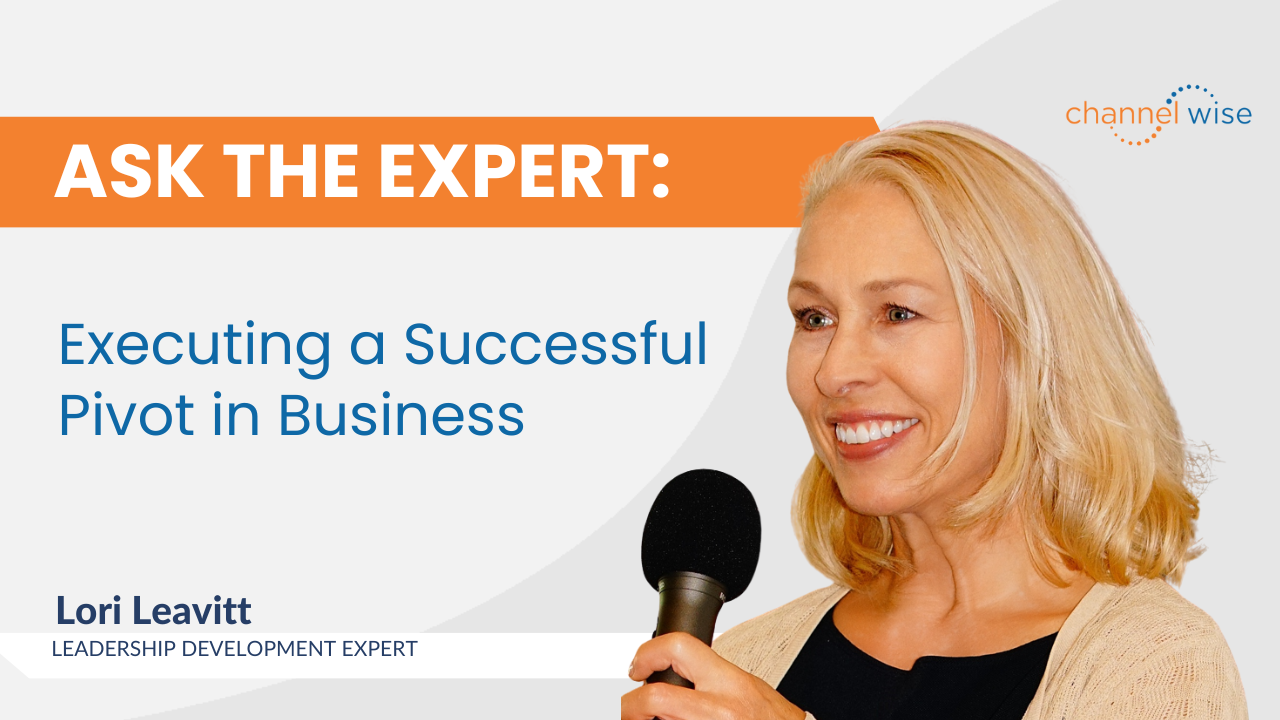Executing a Successful Pivot in Business with Lori Leavitt
Click here to watch the replay:
Being able to pivot and adapt to change is crucial for success. But what exactly does it mean to pivot, and how can leaders orchestrate this change within their organizations?
To gain insight into these questions, Kathryn Rose, CEO & Founder of channelWise, spoke with Lori Leavitt, a channelWise expert known as the Pivot Catalyst, who has written two books on the subject. Their discussion explored the concept of pivoting in business, the importance of cultivating a culture of experimentation and innovation, and how leaders can balance the need to pivot while maintaining organizational stability.
Highlights:
- Pivoting should be part of a culture where everyone is ready to change and should not be approached as a one-time project or initiative.
- Leaders should create a culture of experimentation and innovation while also recognizing that stability and day-to-day tasks still need to be maintained.
- To achieve an extraordinary ideal organization while maintaining stability, leaders must be "focused and nimble," involve those closest to work in strategic planning sessions, and have the courage to communicate a vision for the future of the workplace.
What is the concept of pivoting in business?
The concept of pivoting in business involves not just making a quick decision to change but also the awareness that change is needed and realizing that change. This insight came from my past experience and from writing my book,
The Pivot: Orchestrating Extraordinary Business Momentum. Pivoting should be part of a culture where everyone is ready to change and should not be approached as a one-time project or initiative. I want to help leaders orchestrate such a culture through my knowledge and expertise.
What is your insight on realizing and executing a pivot?
Realizing and executing a pivot, whether a personal change or leading an organization, requires more than just the individual. It involves getting clear enough to set direction and communicating it to everyone so they can commit to it. This is why I wrote my second book,
Pivot to Clarity. It's important to pause and think about what would be extraordinary instead of focusing on incremental improvements. Unless you're going towards something extraordinary, you won't have momentum, and it'll just be day after day fighting fires. I encourage individuals to allow themselves to think about what's possible and not immediately interrupt themselves with self-doubt.
Why must leaders cultivate a culture of experimentation?
It is important for leaders to cultivate a culture of experimentation and innovation because it creates a safe space for communication, openness, and empowerment. When an organization is focused and nimble, with a clear direction, employees can filter their work through that direction and make decisions that move the organization toward its vision. Without this culture, employees may only do what they think is expected of them, which may not align with the organization's goals.
How can leaders lead change while maintaining stability?
As a leadership expert, two things are crucial for leaders to maintain stability while pivoting towards an extraordinary ideal.
First, I advocate for being focused and nimble, which means focusing on the work at hand and being adaptable enough to understand the direction in which the organization is headed. This doesn't necessarily mean changing something every day. Instead, it's about the flow of work and working together to make decisions that align with the organization's goals.
Second, I recommend working on empowerment within the organization. As a leader, I may have a global view of the organization, but I don't know how the work is being done on the ground. To address this, I suggest involving those closest to work in strategic planning sessions and asking for their input on measuring progress and which initiatives would work best for their teams. This approach helps keep the workflow going and ensures everyone is aligned with the organization's goals.
How do you see leadership and workplace culture evolving in the future?
Focusing on wellness and how people feel are important for the future of the workplace. Leaders need to notice how people are being and feeling and should be open to communication from their employees. Additionally, leaders must have the courage to communicate a vision for what the organization should look like in the future and inspire their employees to take action toward that vision.
For more advice about leadership, visit Lori's profile on channelWise.
Check out channelWise.com for more experts to help you with your business or career.
Note: Transcript is edited for time and clarity.








